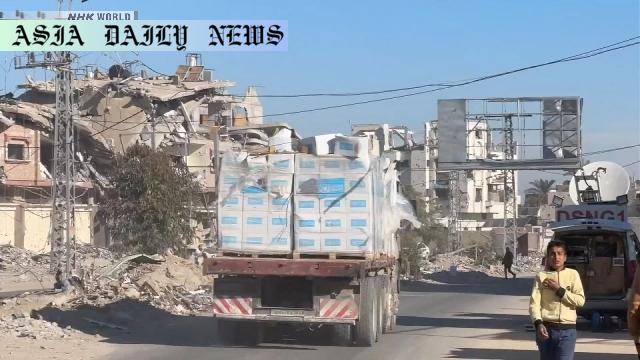UNRWA continues to deliver aid to Gaza despite the Israeli government’s operational ban on the organization.
UNRWA vows to provide humanitarian aid to Gaza, despite Israel’s operational ban.
Israel accuses UNRWA staff of involvement in Hamas attacks.
UNRWA plans to collaborate with other agencies to ensure aid delivery.

UNRWA’s Unyielding Commitment: Navigating Challenges to Deliver Aid in Gaza
Israel’s Ban on UNRWA: A Hindrance to Aid
The United Nations Relief and Works Agency for Palestinian Refugees (UNRWA) has recently come under scrutiny following a ban imposed by Israel on its operations within the country. This decision, which took effect on Thursday, accuses some UNRWA staff of alleged involvement in the Hamas-led attacks in October 2023. This development led to the closure of the agency’s office in Jerusalem, where the scene was further marred by graffiti defacing its signboard.
Director of Health at UNRWA, Seita Akihiro, has voiced concerns over the challenges this ban creates in delivering much-needed aid to the Gaza Strip. While ongoing efforts persist in the enclave and other areas, the ban is anticipated to complicate logistics and access to Gaza considerably.
UNRWA’s Commitment to the Humanitarian Cause
Despite these hurdles, UNRWA remains steadfast in its mission. As articulated by Seita, the agency has no intention of ceasing its provision of aid. Recognizing the gravity of the situation in Gaza, the organization is exploring avenues to expand collaboration with other humanitarian organizations to ensure critical supplies and support reach those in need.
The agency’s work has long been pivotal in addressing the needs of Palestinian refugees, offering assistance ranging from health services to education. In light of Israel’s operational restrictions, UNRWA is actively seeking alternative strategies to maintain this support structure and safeguard the well-being of those who depend on its services.
The Challenges Ahead
The operational ban imposed by Israel creates significant logistical and political challenges for UNRWA. The accusation of staff complicity in the October attacks adds layers of complexity, as the agency must not only clarify its stance but also manage heightened scrutiny. This situation jeopardizes UNRWA’s operational efficiency as it seeks to navigate political tensions while upholding its humanitarian mandate.
Additionally, restrictions extend to the coordination of aid delivery through Israeli-controlled territories, a major route for supplies entering Gaza. This restriction increases reliance on neighboring countries and intensifies the operational risks faced by aid workers. Such disruptions can sharply impact the speed and volume of humanitarian supplies reaching the area.
Collaboration and Hope
In response to these challenges, UNRWA is shifting toward partnerships with other humanitarian organizations. By pooling resources and expertise, the agency aims to maintain its assistance levels. Coordination with international bodies and local entities is envisioned as key to sustaining operations under restrictive conditions.
UNRWA’s optimism about working alongside other groups underscores the global humanitarian community’s resilience. It reflects a shared commitment to ensuring no Palestinian refugee is left without aid, irrespective of political hurdles. This collaborative spirit is likely to remain a cornerstone of UNRWA’s strategy moving forward.
Implications for the Region
While UNRWA stays committed to aiding Gaza, the operational ban serves as a stark reminder of the ongoing struggles faced by humanitarian efforts in politically volatile regions. The situation underscores the fragile nature of aid mechanisms that must operate within the confines of political disputes and security concerns. The future of UNRWA’s operations will likely hinge on the outcome of ongoing diplomatic dialogues and international pressure to allow freer access to Gaza for humanitarian agencies.
Furthermore, this situation highlights the critical need for transparent investigations into allegations raised against organizations like UNRWA. Resolving these accusations is vital not only for operational continuity but also for public trust in international humanitarian agencies.
As the global spotlight remains on Gaza and the wider Middle East, UNRWA’s efforts stand as a testament to the importance of impartial and unwavering humanitarian commitment in times of crisis.



Commentary
Reflecting on UNRWA’s Role Amid Challenges
The Resilience of UNRWA
UNRWA’s decision to continue providing aid to Gaza, despite the operational ban imposed by Israel, serves as a powerful reminder of the resilience and perseverance inherent in humanitarian work. In an era where political complexities often obstruct lifesaving initiatives, such steadfastness is both commendable and inspiring.
The ability to rise above accusations and logistical hurdles underlines the organization’s unwavering commitment to its mission. It reiterates that humanitarian efforts should remain apolitical, focused solely on alleviating human suffering. UNRWA is walking a fine line, balancing its mandate amidst political turmoil while ensuring aid continues to flow to those in dire need.
A Call for Global Support
This situation also raises broader questions about the responsibilities of the international community. Should humanitarian organizations like UNRWA bear the sole burden of addressing crises in politically charged regions? Or should more robust, coordinated efforts by global players step in to ensure the integrity of humanitarian missions?
As UNRWA explores collaborations with other aid organizations, it is crucial for global governments and civil society to amplify their support. This not only bolsters the agency’s reach but also sends a strong message affirming the sanctity of humanitarian principles.
The Human Cost of Political Disputes
At the heart of this issue are the countless lives depending on UNRWA for survival. Every restriction imposed, every delayed shipment, directly affects the well-being of some of the world’s most vulnerable populations. It is a sober reminder that political disputes have profound human costs, and addressing these should remain a priority for all stakeholders involved.
In conclusion, UNRWA’s ongoing efforts in Gaza should be not just a cause for admiration but also a rallying point for global solidarity. Supporting such initiatives ensures that humanitarian work can continue uninterrupted, irrespective of political challenges.